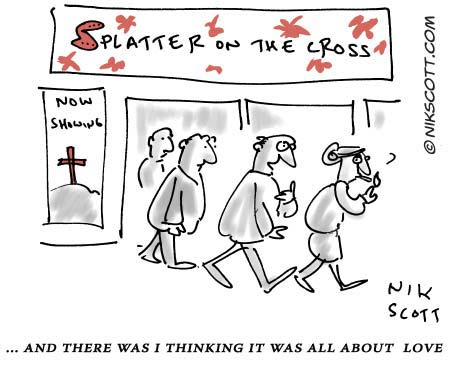
Braveheart: The Passion of the Christ
I was one of those who helped give the The Passion a thumbs up in box office receipts on its opening weekend. I know what you are thinking. Do we really need another review of this movie? No we don't, but if you have already read 100 opinions then reading 101 won't hurt.
I first wrote about this movie back on September 19, 2003. My focus at that time was Mel Gibson's shrewd use of the Christian right to deflect criticism of his film. Since then he has used the Pope to deflect criticism, which is funny considering that Gibson is a traditionalist Catholic who supposedly disavows Vatican authority. At any rate, he knew that it didn't hurt to claim the Holy Father was on his side.
We have since learned that Mel's dad is a holocaust denying anti-Semite, and Mel thinks non-Catholics, including his own wife, are bound for hell and damnation. Of course this Protestant bashing hasn't kept conservative Christians from continuing the big suck up to their new hero. The controversy surrounding this film has certainly created a hypocrisy fest.
The Passion is very well made. I can understand why most movie goers liked it. I appreciated the artistry and the successful telling of a gripping story in dramatic fashion. Gibson knows how to make an epic that holds the viewers attention. Who would have guessed that Americans would line up to see a film with dialogue in Latin and Aramaic?
However, I am uncomfortable with a story about Jesus that concentrates on his death. The Passion was a lost opportunity to tell us how Christ lived and how he expected the rest of us to live. There are a few flash backs to tell us that his ministry taught love and forgiveness, but the emphasis is on the brutalized Christ. He is like the protagonist of another Mel Gibson movie. William Wallace, Braveheart, spits out his pain killer and takes being drawn and quartered like a macho action hero.
One of the ways Gibson defended himself was by claiming that the film was faithful to the Gospels. If you don't like the movie well then you don't like the Gospels either. Of course he gets the basic information right but the description of Christ's arrest, trial, torture and crucifixion is brief. You can't make a two hour film about the Passion without some degree of creative license. I suppose that is why we have a Satan figure hovering in the background who resembles a bad drag queen.
The violence in the movie is excessive. At one point I had to close my eyes. Every time I thought the beating had stopped it went on and on and on. The Gospels say "They scourged him." They don't say how many lashes and how long it took to deliver them. Again we have Mel Gibson's imagination at work under the guise of accuracy to biblical text. We also have one of the film's flaws. Anyone beaten that much would have been dead before he was crucified. When we finally get to the crucifixion the torture still hasn't ended. We see both nails driven into his flesh in graphic detail, then we see the nailing of his feet, then the Roman soldiers turn the cross upside down to beat down the nails even more. Dear Mel, we get it already!
In this story the villains are Jewish and their victim is God on earth. Well, we can see how anti-Semitism began. Gibson gives Pilate more credit than the Gospels do for being angst ridden about condemning Jesus. It is true that a Roman proconsul in that situation would have stuck his finger in the air to see which way the wind was blowing. If the local authorities, in this case Jewish high priests, wanted an execution and if relenting wouldn't cause an uprising he would let them have their execution.
Unfortunately, the overly sympathetic portrait of Pilate does give credence to the anti-Semitism charge. The blame for the death of the majority culture deity has been a cause of persecution committed against Jews throughout Christian history. Jews were in a no-win situation in talking about this movie. If they say nothing they are Uncle Toms. If they speak up they are accused of denying Christians the story of their faith.
I understand Jewish discomfort with the subject matter, but at times I have felt that gentiles were deemed guilty until proven innocent. There was an implication that while we may not all be anti-Semites we can't be trusted to see a depiction of Jews condemning Jesus. One would have thought that Christians would leave the multiplex and start pogroms on the way home.
Most American Christians in the 21st century do not spend time blaming Jews for the death of Christ. We are not medieval Germans at Oberramagau and we are capable of pondering the significance of the crucifixion without turning into anti-Semites. I don't know if Caiaphas or Pilate was more responsible for the death of Jesus and neither does anyone else. We also shouldn't care who was more responsible. We only need to remember that Jesus chose death and he forgave his killers. The debate should be over, but Americans love to be outraged. What happens if the movie is nominated for Oscars next year? What happens if it isn't? I would prefer going through Lent next year without reading the words Mel and Gibson every time I pick up a newspaper.
By the way, which outrage of 2004 was the least edifying, Janet's breast or The Passion? It seems we can never have enough controversy in America and the year is still young.
